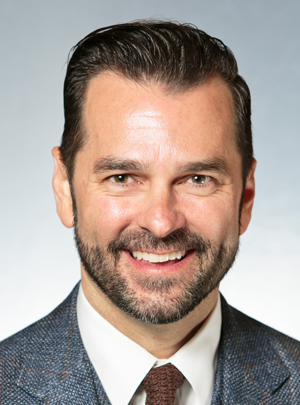 John Thompson
John Thompson
Senior vice president, sourcing operations
Vizient Inc.
Irving, Texas
About John Thompson:
Born and raised in Wichita, Kansas, Thompson got started in healthcare working in a nursing home to help finance his education at Wichita State. “I liked helping people and saw a dynamic industry with a lot of career options,” he says. His next job – while still in college – was working for a healthcare consulting firm processing Medicare cost reports. “My initial plan was to become a nursing home administrator, but as things evolved I decided to focus on healthcare administration and get a minor in gerontology and a minor in sociology.” After graduation, he worked for a large cardiovascular physicians group for seven years and got involved in many aspects of the practice, including procurement. In 1999, he joined Novation (now Vizient), with a role in surgical contracting.
At Vizient, he leads the HR and Workforce Solutions verticals as well as Vizient Insurance Services. Vizient works with about 600 staffing agencies to fulfill contract labor needs in clinical, allied, IT and non-clinical roles. In addition, Vizient helps hospitals and health systems form benefit plans around health, dental, life, disability and pharmacy.
“Being with Vizient almost 20 years, I’ve had an opportunity to experience many different responsibilities and roles – working with leaders and mentors, bringing in talent, looking at how we operationalize a business and how we can drive value back to the member. How you work with teams, listen to stakeholders, understand their needs, put opportunities in place to help them leverage their spend – that applies whether you’re in sourcing or overall labor management.”
About Vizient:
Vizient was founded in 2015 as the combination of VHA Inc., a national network of not-for-profit hospitals; University HealthSystem Consortium, an alliance of academic medical centers; and Novation, the healthcare contracting company they jointly owned. In February 2016, Vizient acquired MedAssets’ Spend and Clinical Resource Management (SCM) segment, which included Sg2 healthcare intelligence.
Most challenging/rewarding project in the past 12-18 months:
“Over the last year, I have been working with certain segments of the Vizient sourcing and consulting teams, such as purchased services and food, [to offer] contracts on the business side of care that can lower costs, and subject matter experts with data, insights and expertise to help with implementation, so that savings are realized and sustained. It has been exciting to work cross-functionally, using data and leveraging expertise, to connect all of the dots for suppliers, supply chain and clinicians, as well as with finance and other facility stakeholders.”
Looking forward to:
“One of our bigger projects is building out our human resources and workforce solutions verticals. Vizient has a comprehensive offering of solutions, such as insurance products and employee benefits, contract labor and labor consulting/utilization.”
How are you better at practicing your profession today than you were five or 10 years ago?
“I have been fortunate to have had some extraordinary leaders and mentors who have helped me understand that success in the healthcare supply chain requires a consistent focus on next-generation ideas grounded in historical knowledge. That approach and their coaching have helped me look for opportunities to more effectively engage internal and external stakeholders as the company and the industry have evolved. … I have also become a better listener, which has helped me understand how our stakeholders define value and has reshaped how I partner with them to achieve their goals.”
What are the challenges or opportunities facing the next generation of supply chain executives?
“I think the scope of improvement opportunities in the health care supply chain is one of its biggest challenges. Supply chain operations in other business sectors have grown in sophistication and efficiency because of data and technology and resources. However, we aren’t making widgets; we are providing an incredible array of medical supplies, devices, drugs and equipment so clinicians can care for and heal people and run a financially stable business.
“It is critical that supply chain professionals coming into this industry understand how and why decisions are made in their organization, what data is required, who needs to be included in the process, and how to effectively communicate across the organization when decisions affecting supplies and products are made. I encourage supply chain professionals at every level to take advantage of the educational opportunities offered by various organizations to increase understanding of not just the latest technology, but also the strategies that are required to successfully lead change.”
